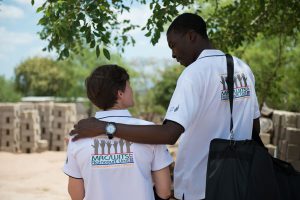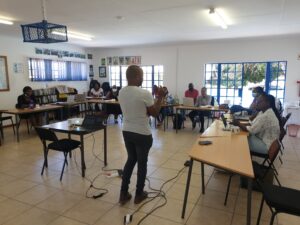
Agincourt builds capacity of local staff, has a data intern program, and supervises/mentors doctoral students, postdoctoral fellows, and early and mid-career researchers.
The Unit has contributed to teaching and learning through its internal academic program, as well as through contributing to teaching underway as part of the School of Public Health academic program. The student section will provide more information on teaching and learning activities of the Unit. Notable ad hoc training initiatives include:
- Regular data intern training programme (aimed at junior data managers in the Unit with either a diploma or first degree)
- Data and analysis workshop on accessing and using publicly available data from Health and Ageing in Africa: A Longitudinal Study of an INDEPTH Community in South Africa (HAALSI) attended by health and social science researchers from Universities in Gauteng, UKZN, SAPRIN nodes, Statistics South Africa.
- Workshops run by INDEPTH’s Multi-centre ‘Analysis of the Dynamics of Internal Migration And Health’ (MADIMAH) leadership for scientists from participating HDSS research centres focusing on standardising HDSS data for multi-centre, comparative analyses; and the use of event history analysis of migration, mortality and household composition data. As tools for capacity development, the techniques employed in managing and analysing HDSS data have been published in two open-access training manuals during the period.
- Project-specific training of fieldwork teams around research methods, research ethics, data quality. For example a verbal autopsy training workshop for the South African National Cause of Death Validation Project led by the SAMRC Burden of Disease Unit and funded by the CDC USA, Migrant Health Follow-Up study annual fieldwork training, SAPRIN fieldwork training etc.
- Seminars to doctors practicing clinical medicine at Tintswalo Hospital to assist in improving service delivery.
- During 2020 a series of initiatives around COVID training took place: doctors and nurses at Tintswalo Hospital and clinics, educators in the Bushbuckridge sub-district, and staff of the MRC/Agincourt Unit.
GEMP PROGRAM SUPPORT FOR WITS FACULTY OF HEALTH SCIENCES
As part of the Graduate Entry Medical Programme (GEMP), GEMP 4 students do a Public Health Module in Bushbuckridge. During the reporting period, young researchers and a post-doc had the opportunity to prepare lectures for the GEMP4 students who were then evaluated based on their development of fact sheets that summarize the findings of the MRC/Wits-Agincourt Research Unit publications. These fact sheets are then presented to the Agincourt communities. Going forward this work will extend with a closer collaboration with the Faculty of Health Sciences in the preparation of the GEMP4 module in Bushbuckridge.
Staff capacity development
High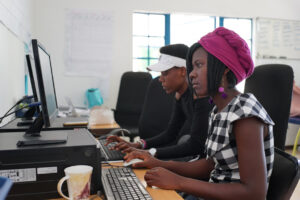 er degrees
er degrees
Over the past 7-years, several Unit research and management staff obtained or are working on higher degrees while conducting and managing research: a total of 8 PhDs over the past 5 years (and 11 over the past 10 years). Since 2012:
- 3 staff were awarded PhDs: Xavier Gómez-Olivé (2014), Paul Mee (2015); Ryan Wagner (2016); Sulaimon Afolabi (2017); Chodziwadziwa Kabadula (2018); and Mandy Maredza (2018).
- 3 staff are currently enrolled for a PhD: Rhian Twine, Daniel Ohene-Kwofie, Aviva Tugendhaft
- Ngoni Ngwarai completed a Masters in Management in 2015 and Floidy Wafawanaka is currently enrolled for a Masters in Pharmacy Practice.
Progression of early to mid-career scientists
Since our previous review, a number of Unit staff have been awarded competitive personal fellowships that indicate high level recognition of research capacity and potential. Carren Ginsburg and Alisha Wade have career development awards from the SAMRC and Fogarty Center, NIH respectively; while Xavier Goméz-Olivé, Chodziwadziwa Kabudula, Mandy Maredza and Ryan Wagner were awarded research fellowships in the US, Australia, UK and SA.
In addition, various training workshops have been organized for staff:
- Occupational Health Safety and Environment; ERP systems-(Oracle, Procure to Pay,HR Online, Pastel Sage Evolution); Performance Management; Fast track to Leadership and Development; MS Office; Employee relations; Fleet management; Supervisory Development Programme; Exceptional Office Management.
- Retirement planning; Fundamentals of Project Management; Resilience for managers; Personal excellence; Money Sense.
Other staff training
Interns
For some years, the Unit has run a successful internship programme for junior data managers (with either a diploma or first degree), and has recently introduced internship opportunities for local youth interested in research management and administration. The data interns have been particularly successful, with most progressing to positions within the Unit after the 6-month internship, first to Data Administrator and then Data Specialist. With growing experience, ongoing on-the-job training and formal study, these staff members play a crucial role within the Unit’s data section. An indicator of the valuable skills acquired by our data staff, is their success in securing positions in other research organisations.
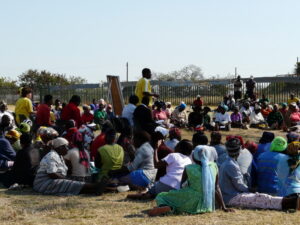
Community Capacity Building
Building the Community Advisory Group (CAG)
The Agincourt Public Engagement Office (PEO) ran an annual capacity building and team building workshop for CAG members. These 2-day workshops were held off-site at a nearby conference centre/lodge and were well attended (75% to 90% of the 24-28 participated). Workshops focused on building communication skills, research ethics, research protocols, team building, and roles and responsibilities including annual work plans. A couple of workshops benefited from materials and input from the HIV Prevention Trials Network (HPTN). In addition, Audrey Khosa (Public Engagement Officer) and Sydney Sibuyi (CAG Spokesperson) attended the HPTN 068 AGM in Washington DC in June 2012, and Simon Khoza (Public Engagement Officer) attended in May 2013.
Over time, the CAG has developed into a group of individuals, representing most villages in the study area, that has a clear understanding of research activities, and are willing to assist the unit in achieving its goals.
Building members of the study communities
Recruitment workshops: Over two months in 2014, the Public Engagement Office and HR section ran workshops in 21 villages on how to apply for a job, how to write a CV, and on interview skills. These focused particularly on work opportunities within the MRC/Wits Agincourt Unit.
Tertiary Admissions Project (TAP) aims to facilitate ‘high potential’ rural youth to apply to tertiary education institutions. This project provides information on application procedures to 30 high schools in Bushbuckridge and includes a CD with numerous bursary application forms and tertiary education application forms. A major barrier identified in 2010 was poor access to National Benchmark Test (NBT) sites, the closest of which was a minimum of 1 hour away. Rhian Twine worked with the NBT Test Centre to establish two NBT sites in Bushbuckridge, now coordinated by Audrey Khosa. Together, the two sites runs 16 tests annually with 15 to 60 students writing each test.
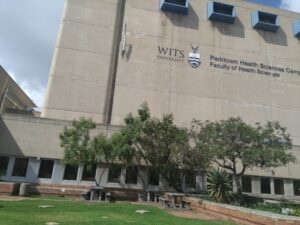 Training for other institutions
Training for other institutions
INDEPTH Network
From 2012 to 2016, the Unit (led by Collinson and Ginsburg) ran five training workshops for scientists from participating HDSS research centres. These focused on: standardising HDSS data for multi-centre, comparative analyses; event history analysis; migration, mortality and the epidemiological transition; and interpretation of analytic findings.
Support to Soweto-CHAMPS research site
The Unit provides technical support to the newly established Child Health and Mortality Prevention Surveillance (CHAMPS) site, led by Prof Shabir Madhi, which intends to align its field and data operations to those of the Agincourt HDSS, as part of establishing an urban HDSS in Soweto.
Supporting verbal autopsy (VA) methods
Support is going to the Dikgale HDSS, Aurum Institute, and the SAMRC Burden of Disease Unit’s National Cause of Death Validation Study.
CARTA
The Agincourt Unit plays a key role within CARTA (Consortium for Advanced Research Training in Africa), part of the Wellcome African Institutions Initiative.
Sabbatical visits
Over the review period, the Unit hosted several international scientists on sabbatical, all of whom spent an extended period at the Wits Rural Campus. They include Professors Peter Byass (Umeå University, Sweden), Justine Davies (Kings College, London and Lancet Diabetes and Endocrinology) and Miles Witham (University of Dundee, Scotland). All have become honorary staff of the Unit/School of Public Health and collaborate on joint research.

